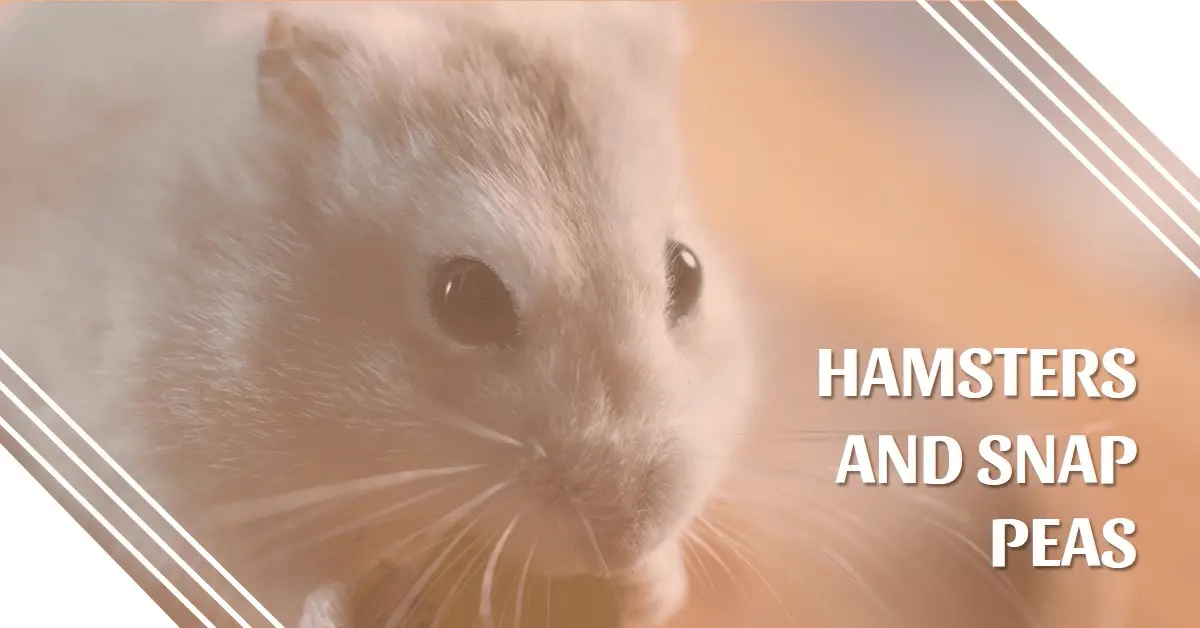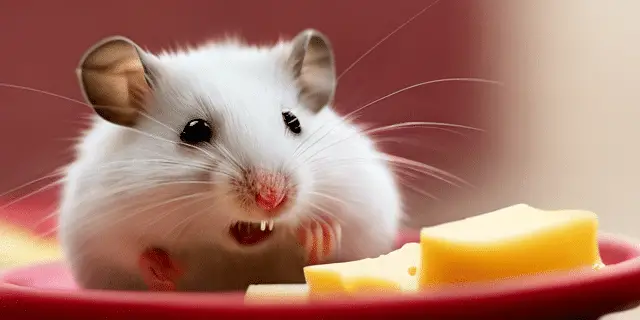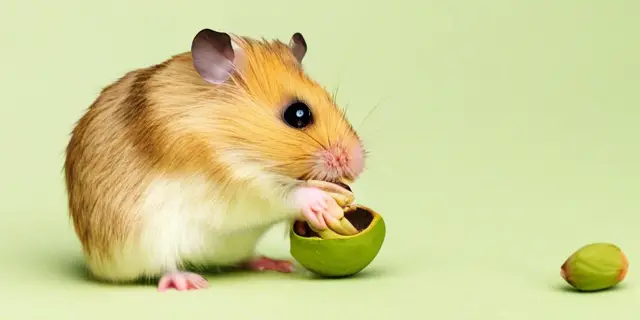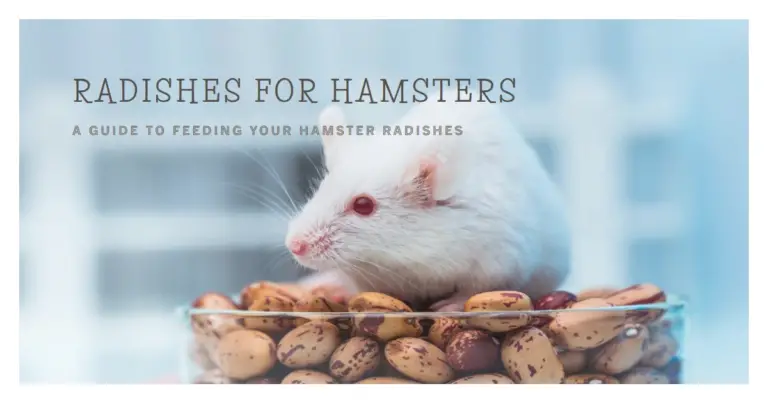Introduction
As a hamster owner, ensuring your furry friend receives a well-balanced and nutritious diet is crucial for their overall health and well-being. While hamsters are omnivores and can consume a variety of foods, it’s essential to understand which foods are safe and beneficial for them. One question that frequently arises among hamster enthusiasts is whether these adorable pets can eat snap peas. In this comprehensive guide, we’ll explore the topic in-depth, covering the nutritional value of snap peas, their potential benefits and risks for hamsters, and how to incorporate them safely into your pet’s diet.
Can Hamsters Eat Snap Peas?
The short answer is yes, hamsters can eat snap peas in moderation as part of a balanced diet. Snap peas are generally considered safe for hamsters and can provide a range of nutritional benefits when introduced properly.
What Are Snap Peas?
Before delving into whether hamsters can eat snap peas, let’s first understand what snap peas are. Snap peas, also known as sugar snap peas or sugar peas, are a variety of edible-pod peas that belong to the legume family. They are a hybrid between garden peas and snow peas and are characterized by their flat, crisp pods that are entirely edible, including the seeds inside.
Nutritional Value of Snap Peas
Snap peas are highly nutritious and packed with a variety of essential vitamins, minerals, and other beneficial compounds. Here’s a breakdown of their nutritional content:
- Vitamins: Snap peas are an excellent source of vitamin C, vitamin K, and various B vitamins, including folate, thiamine, and vitamin B6.
- Minerals: They contain a range of minerals, such as iron, manganese, phosphorus, zinc, and copper.
- Fiber: Snap peas are a good source of dietary fiber, which is essential for proper digestion and gut health.
- Antioxidants: These peas are rich in antioxidants like lutein, zeaxanthin, and vitamin C, which can help protect against oxidative stress and inflammation.
- Low in Calories and Fat: Snap peas are low in calories and fat, making them a healthy and weight-friendly snack option.
Benefits of Snap Peas for Hamsters
- Hydration: Snap peas have a high water content, which can help keep your hamster hydrated, especially during hot weather or if they are reluctant to drink from their water bottle.
- Fiber: The fiber in snap peas can aid in maintaining a healthy digestive system and preventing constipation in hamsters.
- Vitamins and Minerals: The various vitamins and minerals found in snap peas can support overall health and well-being in hamsters, contributing to proper growth, development, and immune function.
- Low in Calories and Fat: The low calorie and fat content of snap peas make them a healthy treat option for hamsters, reducing the risk of obesity and related health issues.
- Variety: Incorporating snap peas into your hamster’s diet can provide a tasty and nutritious way to add variety and prevent boredom with their food.
Risks and Precautions
While snap peas can be a healthy addition to your hamster’s diet, there are some potential risks and precautions to consider:
- Choking Hazard: Whole snap peas can pose a choking hazard for hamsters due to their size and shape. It’s essential to chop or slice them into smaller pieces before offering them to your pet.
- Gas and Bloating: Like with other legumes, snap peas may cause gas and bloating in some hamsters if consumed in large quantities, especially if they are not accustomed to them.
- Pesticide Residue: If you’re feeding your hamster store-bought snap peas, it’s important to thoroughly wash them to remove any potential pesticide residue, which can be harmful to your pet’s health.
- Moderation is Key: As with any treat or supplement, snap peas should be given in moderation and should not replace a hamster’s regular, balanced diet.
How to Feed Snap Peas to Your Hamster
If you decide to feed snap peas to your hamster, it’s crucial to do so safely and in an appropriate manner. Here are some tips:
- Portion Control: Start with a small portion, such as 1-2 snap pea pieces per adult hamster, and gradually increase the amount based on your pet’s tolerance and acceptance.
- Chop or Slice: To prevent choking hazards, always chop or slice the snap peas into smaller pieces before offering them to your hamster.
- Introduce Slowly: When introducing a new food item, like snap peas, to your hamster’s diet, it’s essential to do so gradually and monitor for any signs of digestive issues or allergic reactions.
- Provide Variety: While snap peas can be a healthy addition to your hamster’s diet, it’s important to offer a variety of fresh fruits and vegetables to ensure a well-balanced and nutritious diet.
- Combine with Other Treats: You can mix snap peas with other safe treats, such as small pieces of fresh fruits or unsweetened cereal, to create a tasty and nutritious mix for your hamster.
Incorporating Snap Peas into Your Hamster’s Diet
If you’ve decided to incorporate snap peas into your hamster’s diet, here are some tips on how to do so effectively:
- Fresh or Frozen: You can offer your hamster fresh snap peas or frozen ones that have been thawed and chopped or sliced. Frozen snap peas can be a convenient option when fresh ones are not in season.
- Mix with Other Vegetables: Snap peas can be combined with other hamster-safe vegetables, such as small pieces of carrots, cucumbers, or bell peppers, to create a nutritious and flavorful mix.
- Use as a Training Reward: Snap pea pieces can be used as a healthy training reward when teaching your hamster new tricks or behaviors.
- Rotate with Other Treats: To maintain a balanced diet, rotate snap peas with other occasional treats like unsweetened cereal, cooked plain grains, or small amounts of fresh fruits.
FAQs: Common Questions About Hamsters and Snap Peas
Here are some frequently asked questions about feeding snap peas to hamsters:
- Can hamsters eat the stems and leaves of snap peas?
Yes, hamsters can eat the stems and leaves of snap peas in moderation, as they are also edible and contain nutrients. - Can baby hamsters eat snap peas?
It’s generally recommended to avoid feeding solid foods, including snap peas, to baby hamsters until they’re fully weaned and around 6-8 weeks old. - Can hamsters eat canned or cooked snap peas?
It’s best to avoid feeding your hamster canned or cooked snap peas, as they may contain added salt, preservatives, or other seasonings that could be harmful. - How often can I give my hamster snap peas?
Snap peas should be given as an occasional treat, no more than a small portion (1-2 pieces) per day for an adult hamster. They should not be a regular part of their daily diet. - Can snap peas cause digestive issues in hamsters?
While snap peas are generally safe for hamsters, some individuals may experience gas, bloating, or digestive discomfort if they consume too many or if they are not accustomed to them. Introduce them slowly and monitor your hamster’s reaction.
Conclusion
In moderation and with proper precautions, snap peas can be a safe and nutritious treat for hamsters. They offer a range of vitamins, minerals, fiber, and antioxidants, making them a healthy addition to your pet’s diet. Always introduce snap peas slowly, chop or slice them into smaller pieces to prevent choking hazards, and monitor your hamster for any adverse reactions. Remember, a well-balanced and varied diet is crucial for your hamster’s overall health and well-being, so incorporate snap peas as an occasional treat alongside their regular, balanced diet.
Table: Nutritional Value of Snap Peas (per 100g)
| Nutrient | Amount |
|---|---|
| Energy (kcal) | 26 |
| Protein (g) | 2.6 |
| Carbohydrates (g) | 3.6 |
| Fiber (g) | 2.4 |
| Fat (g) | 0.2 |
| Vitamin C (mg) | 40 |
| Vitamin K (µg) | 24.8 |
| Folate (µg) | 24 |
| Manganese (mg) | 0.18 |
| Iron (mg) | 1.1 |
| Phosphorus (mg) | 38 |
Table: Potential Benefits and Risks of Feeding Snap Peas to Hamsters
| Benefits | Risks |
|---|---|
| Hydration | Choking hazard (if not chopped) |
| Fiber for digestive health | Potential gas and bloating |
| Source of vitamins and minerals | Pesticide residue (if not washed) |
| Low in calories and fat | – |
| Variety in diet | – |
Note: This table summarizes the key potential benefits and risks of feeding snap peas to hamsters. It’s important to follow proper precautions and introduce snap peas gradually to ensure your hamster’s safety and well-being.





